Larry McMurtry has Written More Than 20 Novels and They All Started in the Same Place

“When Augustus came out on the porch, the blue pigs were eating a rattlesnake – not a very big one.”
That is the opening line from Lonesome Dove, perhaps the most popular novel ever written about the Old West in America. One can’t help but keep reading to find out what kind of place it is that blue pigs eat rattlesnakes. The author, Larry McMurtry, has been one of my writing heroes for many years. While neither western novels nor romances (his main genres) are big interests of mine, I picked up one of his books at an airport many years ago and could not put it down. I have always loved the way that McMurtry writes about people and locations.
Young people may not know McMurtry’s earliest hits, even though several have been made into iconic movies and TV shows. Some of them came before my time, too. But as an adult, I have gone back and read a number of those stories, simply because I like the way he describes people and places. Especially places, but don’t let me get ahead of myself yet.
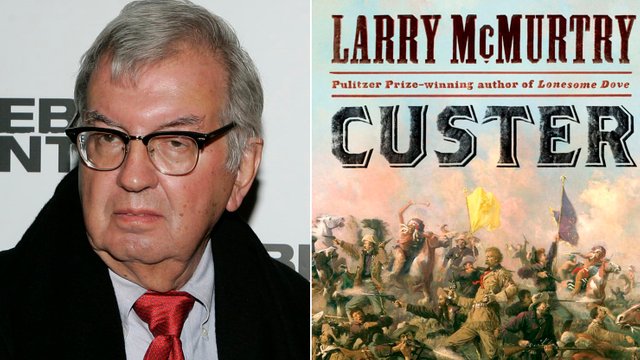
Larry McMurtry and a promotional cover picture from his Custer book.
To report his major novels and accomplishments, I cannot do any better than to paste most of the first paragraph from Wikipedia’s Larry McMurtry page, though it covers only the top echelon of his highlight reel:
His novels include Horseman, Pass By (1962), The Last Picture Show (1966), and Terms of Endearment (1975), which were adapted into films earning 26 Academy Award nominations (10 wins). His 1985 Pulitzer Prize-winning novel Lonesome Dove was adapted into a television miniseries that earned 18 Emmy Award nominations (seven wins), with the other three novels in his Lonesome Dove series adapted into three more miniseries, earning eight more Emmy nominations. McMurtry and cowriter Diana Ossana adapted the screenplay for Brokeback Mountain (2005), which earned eight Academy Award nominations with three wins, including McMurtry and Ossana for Best Adapted Screenplay.
Quote from: https://en.wikipedia.org/wiki/Larry_McMurtry
Aside from the Pulitzer Prize, the Academy Award, and all of those nominations and wins for the films based upon his books and screenplays, McMurtry has been called the best Old West novelist of all time. He may be the best-known writer that the state of Texas has ever produced. And his epic, Lonesome Dove, is perhaps the most popular Western novel of all time. The miniseries based upon the book sold more DVDs than any other Western. While filming it, lead actor Robert Duvall realized what a classic they were making, telling his fellow actors that “we’re making the Godfather of Westerns.”

Ironically, Larry McMurtry wrote Lonesome Dove as the anti-Western. While no living writer is as closely identified as he is with the genre, he has said that the Old West of peoples’ romanticized notions never really existed. His stories rebel against the predominant notion of the macho Old West cowboys and go much deeper into his characters’ humanity, exploring their fears and flaws. The old cowboy story “felt hollow” and he was “bored to death with the 19th century western.”
“I’m a critic of the myth of the cowboy,” he told the New York Times in 2014. ''If you actually read the biography of any of the famous gunfighters, they led very drab, mostly very repetitive, not very exciting lives. But people cherish a certain vision, because it fulfills psychological needs. People need to believe that cowboys are simple, strong and free, and not twisted, fascistic and dumb, as many cowboys I've known have been.''
''You're dealing with a romanticization,'' he added. ''The idea that men are men and women are women and horses are best of all is not a myth that makes for the best sort of domestic life, the best sort of cultural life. It's very exclusionary. It is a code that for all practical purposes excludes women. It shuts almost everything out except nature and work, and I don't think that's good.''
Quotes from: https://archive.nytimes.com/www.nytimes.com/books/99/01/10/specials/mcmurtry-texan.html

And yet, even trying to write around that myth, often in setting his novels later and with multi-faceted characters, he ended up creating iconic works that people see as cornerstones of the Western genre. How ironic.
Larry McMurtry’s characters are incredible, simple and real, but the most important thing I’ve learned from him is the power of place.
Locations matter a great deal to me, but I’ve been fortunate to have lived in some really interesting ones. I cannot imagine being attracted to a hot, dry, dusty little town in the middle of nowhere, but that’s McMurtry’s place.
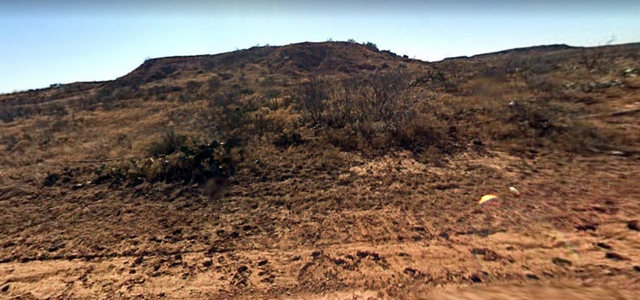
McMurtry grew up near Archer City, Texas, which is not set in a particularly inspiring landscape for those of us accustomed to more hills, water, and greenery. And yet, after many years of living and working in Washington, New York, and Los Angeles, plus travelling internationally, he returned home to his humble family land in Archer County. He even started a used bookstore in the town.
While I have never been to Archer County (if I did, I must have driven through quickly on my way to Dallas without giving it any thought), I visited Google Earth to get some flavor for the land there. All of the landscape images in this post are screenshots I snapped from Google Earth, remotely travelling the roadways around Archer City, Texas. Most of us would look at this landscape and wonder who could love it. Anyone in his or her right mind would move out and move on as soon as possible, right?
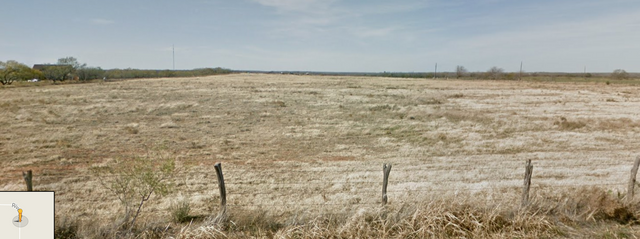
Not McMurtry. A native son could love it and he returned when he had the chance. And that’s not all, as he explained in an interview with New York Times writer Mark Horowitz in 1997. They were sitting on his family’s ranch, at the farmhouse that McMurtry’s grandfather had built, on mostly flat, arid land in Archer County at the base of a small hill. Here is a passage from that article in which McMurtry explains the place’s power over him.
"It's still such a strong landscape for me," he admits, climbing onto the porch and looking out over the flat, empty land, crisscrossed by dirt roads and barbed-wire fences. "I can't escape it in my fiction. I can work away from it, but I always start here. And whatever place I'm writing about, I'm still describing this same hill."
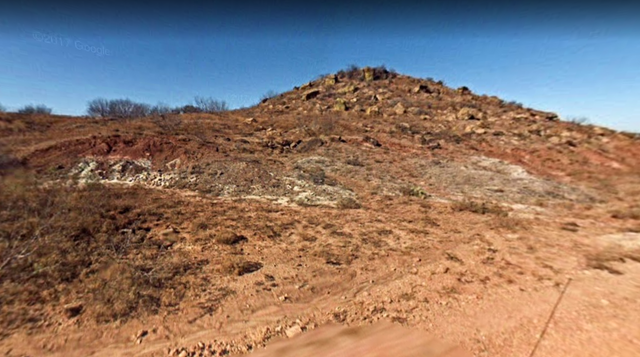
Wow. What a testament to the power of place, even if it’s a dry, dusty spot with few features. How much influence has that one spot held over readers and viewers of McMurtry’s stories and the films based upon them? His hill evokes the landscape of the Old West. I do not have a picture of the exact spot, but all of the images here were taken from Google Earth in the area around his hometown of Archer City, so at the very least you can get a flavor of the place. And I believe the previous picture's small hill is on the same side of Archer City as his property.
By the way, he wrote that first sentence of Lonesome Dove (the quote at the beginning of this post) some years before he penned the novel. He knew it was a powerful opening line, but it was not until many years later that he saw a bus by the side of the road in rural Texas. The name on the bus was ‘Lonesome Dove Baptist Church.’ That became the name for the small town in his story. And as he said in his introduction to the 25th anniversary edition, sometimes a title can save a story.
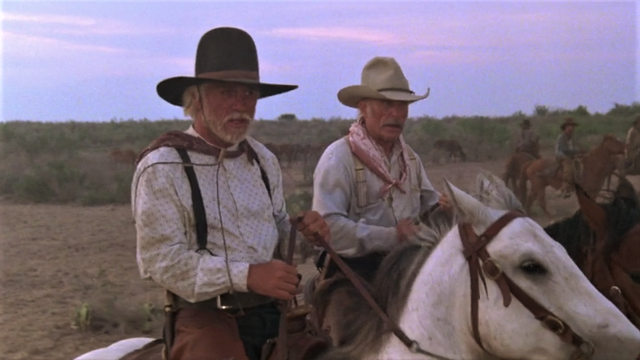
Screenshot from Lonesome Dove miniseries, showing actors Tommy Lee Jones and Robert Duvall. Qintex Entertainment/CBS.
I’ll end with small selections from that book to show what a writer like McMurtry can do with a seemingly desolate landscape.
The sunrises and sunsets feature prominently, as they show the landscape at its best.
A man that depended on an indoor cookstove would miss the sunrise, and if he missed the sunrise in Lonesome Dove, he would have to wait a long stretch of heat and dust before he got to see anything so pretty.
It was tribute enough to sunup that it could make even chaparral bushes look beautiful, Augustus thought, and he watched the process happily, knowing it would last only a few minutes. The sun spread reddish-gold light through the shining bushes, among which a few goats wandered, bleating. Even when the sun rose over the low bluffs to the south, a layer of light lingered for a bit at the level of the chaparral, as if independent of its source. Then the sun lifted clear, like an immense coin. The dew quickly died, and the light that filled the bushes like red dust dispersed, leaving clear, slightly bluish air. (McMurtry, Lonesome Dove, Simon & Schuster, 1985)
From blue pigs eating rattlesnakes to sunlight dispersing into bluish air, I’ll always appreciate how this writer puts the reader in his place.

References:
https://www.texasstandard.org/stories/12-things-you-might-not-know-about-lonesome-dove/
https://archive.nytimes.com/www.nytimes.com/books/99/01/10/specials/mcmurtry-texan.html
https://www.thedailybeast.com/larry-mcmurtry-how-i-write
https://archive.nytimes.com/www.nytimes.com/books/97/12/07/home/article2.html?_r=2
https://www.star-telegram.com/opinion/opn-columns-blogs/bud-kennedy/article69634787.html
All images (except for the two credited in the text) are Google Earth screenshots from the roads around Archer City, Texas.
I sell books and native wildflower seeds, while writing "on the side." We make obscure books relevant to our subject matter available as long as possible, sometimes buying them from the author's descendants or old friends. As long as they are there, we'll keep selling them. There are always a few left.
Good for you. Keep it up as long as you can!
Thank you...
Yes I hope that we would get a lot of creative and imaginative novel writers which will take us to places when their work finally gets picked up also by movie makers because often it gives a better product for movie-goers and book-readers alike to enjoy @donkeypong
This is interesting, his take on the cowboy, But really, people are myth builders. We've done it since we could create a story, make an idealized version of an idea and obsess or long for it. Make it a carrot at the end of a stick or make it the escape to go to when taking a break from the 'carrot on a stick' job.
True. It must be important to the human psyche to believe there is something ideal out there.
I learned quite about from your post. As a writer myself, I've always been interested in the methods and madness other authors have used to write. Great stuff!
That's my main interest here also. I've read every interview this guy has given because his wisdom on writing is so plain and real.
Seems like Larry McMurtry was very deepest writer. That's very interesting story you posted. I never heard or read his awarded books someday. Did you read his lots of books?
A few, yes. His subject areas do not interest me that much, but it's a testament to his writing that if I pick up one of his books, I can't put it down until I'm finished.
Though I saw lots of westerns growing up especially movies with Clint Eastwood in them, I never bothered much with novels set in the old America west. I read a few but I was not invested as such.
I will check out the book that won the Pulitzer prize for myself. I would like to feel what you felt reading it. Hopefully I would get a deeper connection, who knows.
Hopefully, you will. I'm not into Old Westerns otherwise, but somehow I feel this author conveys a lot of wisdom in the way he writes.
Thank you for the introduction to Larry McMurtry. Very interesting. I have never read any of his books. Would Lonesome Dove be a good book to get to know his works? Cheers!
If you like Old Westerns, then yes. I like his writing, even though I'm not a big fan of Old Westerns. :)
Thank you for your reply. I will look out for Larry McMurtry's books.
I am a fan of Charles Dickens and Jane Austen. I am sure I read all their books - something I like to boast of as I don't think there are many people who has. :-)
I've never ready any of his work or seen any of the movies. I'm guessing that has something to do with my age.
The line above caught my eye because I too live in a pretty barren landscape. Maybe that is also why we seem to be blessed with some of the best sunrises and sunsets I have ever seen and I've lived in many parts of the world.
I tell people all the time I miss the greenery that I grew up around in South Carolina. Reading this reminded me to appreciate the uniqueness of what the Arizona desert has to offer even if its not ideal.
You appreciate the beauty even more, I think. There's a starkness to arid and desert landscapes.
I read about Larry McMurtry's life story. I know many of his novels. We have so many writers in our country. Our Bangladesh is such a country, its nature is green and green. A country that can not be overlooked is our Bangladesh. Sleeping in the morning the birds of the call. There are such beautiful beautiful countries that the world has.
Brothers are the real words, I love your post. thanks for sharing
Just to put this list in perspective - and I'm not saying that these novels are bad, but that the choice is of course partial - here is a list of some authors that wrote novels which might have been a very good choice for the list too : Marcel Proust, Isaac Asimov, Jorge Luis Borges, Dino Buzzati, Agatha Christie, Philip K. Dick, Umberto Eco, Federico García Lorca, Louis-Ferdinand Céline, Aldous Huxley, Milan Kundera, Salman Rushdie, Franz Kafka, Alexander Solzhenitsyn, Virginia Woolf, Stefan Zweig, Albert Camus... just to name a few.
It's not a list. It's a post about how one author uses the power of place.